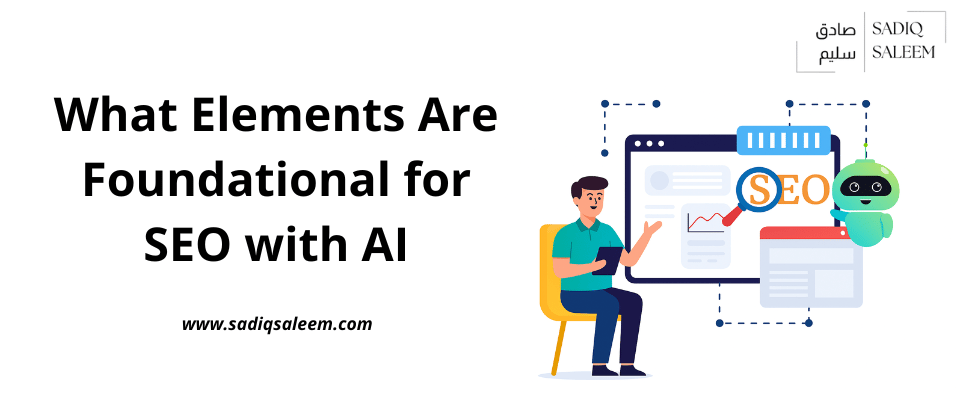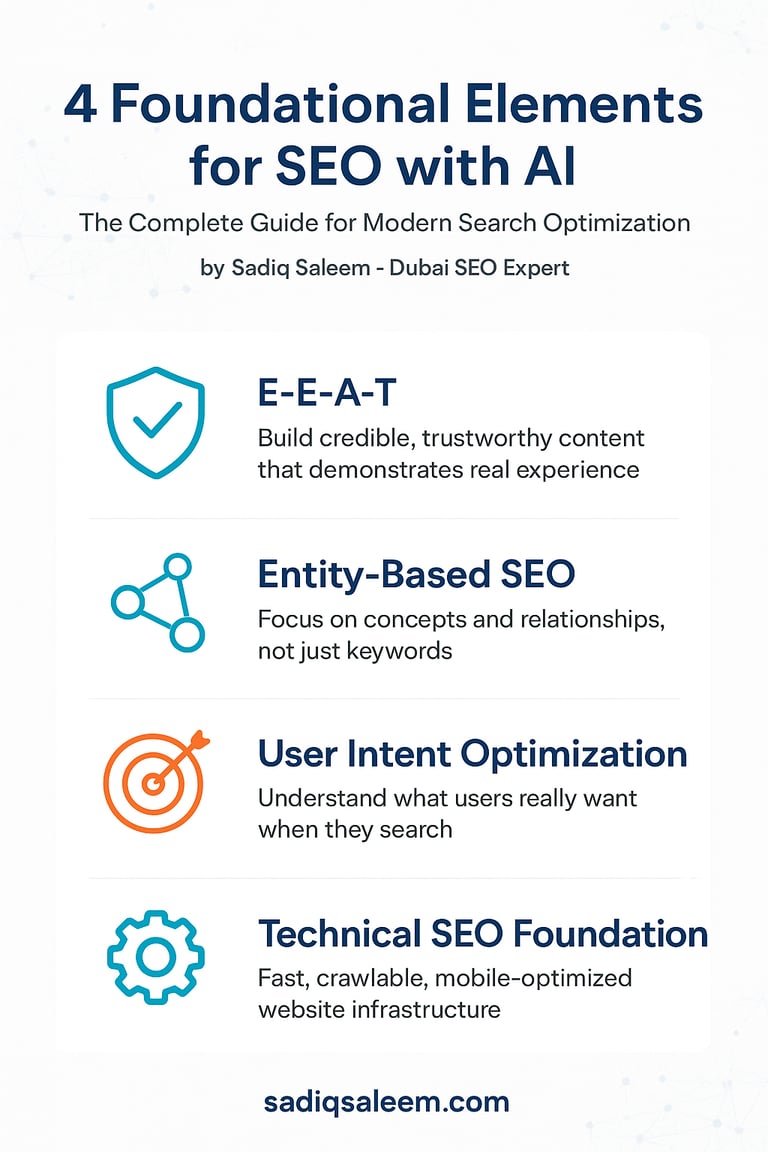What Elements Are Foundational for SEO with AI in 2025?
SEO has evolved beyond keywords. Find out the foundational elements where AI meets search optimization. Get my actionable strategies from 5+ years of experience.
Sadiq Saleem
9/23/20256 min read


What are the foundational elements for SEO with AI that separate successful websites from those struggling to gain visibility? After working in SEO for over five years, I've seen the entire industry transform before my eyes. Gone are the days when we could stuff keywords into content and call it a day. Today's SEO is fundamentally different, and it's all because of AI.
When I started my career as an SEO consultant in Dubai, the market was very simple. But now? There come many search and AI algorithms that actually understand what we're looking for, not just what keywords we're using. It's both exciting and challenging.
New Era of Search Engine Optimisation: AI SEO
Today Google not just matching words anymore, basically it understands context, intent, and relationships between concepts. This change happened gradually, then all at once. One day I was optimizing for "best pizza Dubai," and the next day, Google was understanding that someone searching "where can I get a good slice near me" wanted the same thing.
This shift isn't just technical jargon. It affects how every business shows up in SERP results. Whether you're running a home building business or managing an auto repair shop, know-how of these foundational elements can make or break your online visibility.
Four Important Pillars of SEO with AI
1. E-E-A-T: Your Digital Credibility Score
Experience, Expertise, Authoritativeness, and Trustworthiness – these aren't just fancy acronyms. They're the backbone of modern SEO. Let me tell you in a very simple way:
Experience means you've actually done what you're writing about. If you're writing about SEO, you should have hands-on experience with SEO campaigns. If you're discussing auto repair, you should know the difference between a carburetor and a catalytic converter.
Expertise is about demonstrating deep knowledge. It's not enough to regurgitate information from other sources. You need to add insights, share lessons learned, and provide value that only comes from real experience.
Authoritativeness comes from recognition in your field. Other experts cite your work, industry publications feature your insights, and your peers respect your opinion.
Trustworthiness is about being reliable and transparent. This includes having author bios, citing sources, maintaining accurate information, and being honest about limitations.
Here's what I've learned: AI can help you create content, but it can't fake experience. Google's getting better at spotting content that lacks genuine human insight. That's why businesses need experienced SEO freelancers who understand both the technical and human sides of optimization.
2. Entity-Based SEO: Think Concepts, Not Keywords
This one took me a while to fully grasp. Instead of focusing completely on keywords, you need to think about entities – people, places, things, and concepts that Google recognizes and understands.
For example, when I optimize content about "SEO," I'm not just targeting that keyword. I'm building content around related entities like:
Search engines (Google, Bing)
SEO tools (Ahrefs, SEMrush)
Ranking factors (backlinks, content quality)
Industry experts and companies
The beauty of entity-based SEO is that it naturally creates more comprehensive and helpful content. Rather than stuffing "SEO Dubai" into every paragraph, I prioritize thoroughly covering the topic and its related concepts.
3. Fulfil User's Search Intent
This is where AI has revolutionized SEO. Modern algorithms don't just look at what people type; they try to understand what people actually want.
There are four main types of search intent:
Informational: "How does SEO work?" – People want to learn something.
Navigational: "Sadiq Saleem SEO" – People are looking for a specific website or person.
Commercial: "Best SEO consultant Dubai" – People are researching options before making a decision.
Transactional: "Hire SEO freelancer" – People are ready to take action.
Understanding intent has completely changed how I see content creation. Instead of creating separate pages for dozens of similar keywords, I now create comprehensive resources that satisfy the complete user journey around a topic.
4. Technical SEO
You can have the most brilliant content in the world, but if your website is slow, broken, or confusing to crawl, you're fighting an uphill battle.
The technical fundamentals include:
Site Speed: If your pages take more than 3 seconds to load, you're losing visitors and rankings. I've seen dramatic improvements just from optimizing images and choosing better hosting.
Mobile Optimization: More than half of all searches happen on mobile devices. Your site needs to work perfectly on phones and tablets.
Crawlability: Search engines need to be able to find and understand your content. This means clean URL structures, proper internal linking, and XML sitemaps.
Core Web Vitals: Google's specific metrics for user experience – loading speed, interactivity, and visual stability.
One thing that often surprises people is how changing servers can affect SEO. The technical infrastructure really does matter for search performance.
How AI is Changing the SEO Industry?
The integration of AI into SEO isn't just about using ChatGPT to write content (though that can be helpful when done right). It's about learning how AI-powered algorithms work and optimizing for them.
Large Language Models and Search
The rise of large language models has introduced new challenges and opportunities. LLM SEO is becoming increasingly important as search engines use these models to better understand and generate content.
What I've noticed is that content optimized for AI needs to be:
Extremely clear and well-structured
Factually accurate with proper citations
Comprehensive without being repetitive
Naturally written (not keyword-stuffed)
AI Tools for SEO
The toolset available to SEO professionals has exploded. From content optimization platforms to automated technical audits, AI is making many SEO tasks more efficient and accurate.
Some of the most impactful AI-powered SEO tools I use regularly include:
Content optimization platforms that analyze top-ranking pages
Technical SEO audit tools that can scan thousands of pages in minutes
Keyword research tools that understand semantic relationships
Step-by-step Guide to Start AI-Powered SEO
Step 1: Audit Your Current Foundation
Before discussing the AI optimization, you need to understand where you stand. This means:
Check your technical SEO health
Evaluate your content for E-E-A-T signals
Analyze your current keyword performance
Understand your audience's search intent
Step 2: Develop Your Entity Strategy
Identify the core entities related to your business and industry. Create comprehensive content that thoroughly covers these topics and their relationships. You should use structured data to help search engines better read your content.
Step 3: Optimize for User Intent
Map your content to different stages of the customer journey. Create resources that help people at every stage, from initial awareness to final decision-making.
Step 4: Utilize AI Tools Strategically
Use AI to enhance your work, not replace your expertise. AI excels at:
Research and data analysis
Content ideation and outlining
Technical audits and monitoring
Competitive analysis
But human oversight is essential for strategy, creativity, and quality control.
The Future of SEO with AI
Looking ahead, I see several trends predicting the future of SEO:
Generative Search Results: AI-generated answers are becoming more prominent in search results. This means optimizing for citability and being the source that AI chooses to reference.
Conversational Search: Voice search and chatbot interactions are changing how people find information. Content needs to answer questions naturally and conversationally.
Personalization at Scale: AI enables search engines to personalize results based on individual user behavior, location, and preferences.
Real-Time Optimization: AI allows for faster testing and optimization cycles, making SEO more agile and responsive.
What are the Most Common Mistakes?
Through my experience working with various clients, I've seen several recurring mistakes:
Dependence on AI: AI is a useful tool, but it can't replace human insight, creativity, and strategic thinking.
Ignoring the Basics: No amount of AI optimization can compensate for poor technical SEO or low-quality content.
Chasing Every New Tool: The SEO tool industry changes rapidly. You should master a core set of reliable tools rather than jumping to every new AI-powered platform.
Forgetting About Users: It's easy to get caught up in optimizing for algorithms, but ultimately, we're trying to help real people find valuable information.
Final Remarks
The foundational elements of SEO with AI aren't just about ranking higher in search results. They're about creating sustainable, valuable online presence that serves both users and search engines effectively.
As someone who's helped businesses across various industries adapt to these changes, I can tell you that the companies succeeding in this AI-driven landscape are those that focus on the fundamentals while adapting new tools and techniques.
It is important to find the right balance between using AI capabilities and maintaining the human elements that create truly valuable content and experiences. Whether you're just starting your SEO career or looking to implement your existing strategy, these foundational elements provide a solid framework for success in the age of AI.
Remember, SEO with AI isn't about replacing human expertise – it's about augmenting it. The future belongs to those who can properly combine AI capabilities with human insight, creativity, and strategic thinking.
Do you want to learn more about executing these strategies for your business? Feel free to reach out – I'm always there to discuss how these pillar elements can be applied to particular industries and situations.


Hire Your Reliable SEO Expert in Dubai, UAE
With 5+ years of digital marketing experience, I provide you the effective and affordable SEO services to grow and skyrocket your business.
FOR EXPERT SEO ConsultaNCY
HIRE #1 TOP RATED & trusted SEO GUY
contact@sadiqsaleem.com
© 2026. All rights reserved.
Quick links
